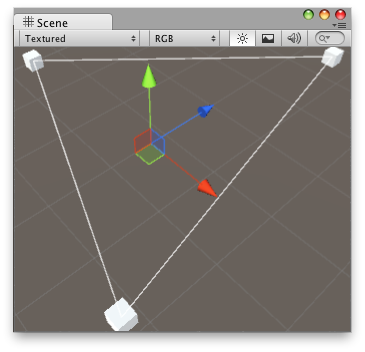Parameters
| lineSegments | A list of pairs of points that represent the start and end of line segments. |
Description
Draw a list of line segments.
 "Draw multiple lines in Scene view.".
"Draw multiple lines in Scene view.".
The following example uses DrawLines to draw a line between GameObjects defined in a list.
To use this example, save the following script into the Assets/Editor folder:
#pragma strict @CustomEditor(DrawLines) public class DrawLinesEditor extends Editor { function OnSceneGUI() { var t: DrawLines = target as DrawLines; if (t == null || t.GameObjects == null)return ; var lineSegments: Vector3[] = new Vector3[t.GameObjects.Length * 2]; var pointIndex: int = 0; for (var i: int = 0; i < t.GameObjects.Length - 1; i++) { if (t.GameObjects[i] != null && t.GameObjects[i + 1] != null) { lineSegments[pointIndex++] = t.GameObjects[i].transform.position; lineSegments[pointIndex++] = t.GameObjects[i + 1].transform.position; } } Handles.DrawLines(lineSegments); } }
using UnityEngine; using UnityEditor;
[CustomEditor( typeof( DrawLines ) )] public class DrawLinesEditor : Editor { void OnSceneGUI( ) { DrawLines t = target as DrawLines;
if( t == null || t.GameObjects == null ) return;
Vector3[] lineSegments = new Vector3[t.GameObjects.Length * 2]; int pointIndex = 0;
for( int i = 0; i < t.GameObjects.Length - 1; i++ ) { if( t.GameObjects[i] != null && t.GameObjects[i+1] != null ) { lineSegments[pointIndex++] = t.GameObjects[i].transform.position; lineSegments[pointIndex++] = t.GameObjects[i+1].transform.position; } }
Handles.DrawLines( lineSegments ); } }
...then attach this script to the anchor GameObject which you would like to see lines come from. Drop GameObjects you would like the lines to go to into the array in the script's inspector, and adjust the gap between the dotted lines accordingly:
#pragma strict @ExecuteInEditMode public class DrawLines extends MonoBehaviour { public var GameObjects: GameObject[]; }
using UnityEngine;
[ExecuteInEditMode] public class DrawLines : MonoBehaviour { public GameObject[] GameObjects; }
Parameters
| points | A list of points. |
| segmentIndices | A list of pairs of indices to the start and end points of the line segments. |
Description
Draw a list of indexed line segments.
The following example uses DrawDottedLines to draw a line between objects defined in a list. To use this example, save the following script into the Assets/Editor folder:
#pragma strict @CustomEditor(DrawLinesUsingPoints) public class DrawLinesUsingPointsEditor extends Editor { function OnSceneGUI() { var t: DrawLinesUsingPoints = target as DrawLinesUsingPoints; if (t == null || t.GameObjects == null)return ; var points: Vector3[] = new Vector3[t.GameObjects.Length]; var segmentIndices: int[] = new int[t.GameObjects.Length * 2]; var pointsIndex: int = 0; for (var i: int = 0; i < t.GameObjects.Length; i++) { if (t.GameObjects[i] != null) points[pointsIndex++] = t.GameObjects[i].transform.position; } for (var i: int = 0; i < pointsIndex - 1; i++) { var segmentIndex: int = i * 2; segmentIndices[segmentIndex] = i; segmentIndices[segmentIndex + 1] = i + 1; } Handles.DrawLines(points, segmentIndices); } }
using UnityEngine; using UnityEditor;
[CustomEditor( typeof( DrawLinesUsingPoints ) )] public class DrawLinesUsingPointsEditor : Editor { void OnSceneGUI( ) { DrawLinesUsingPoints t = target as DrawLinesUsingPoints;
if( t == null || t.GameObjects == null ) return;
Vector3[] points = new Vector3[t.GameObjects.Length]; int[] segmentIndices = new int[t.GameObjects.Length * 2]; int pointsIndex = 0;
for( int i = 0; i < t.GameObjects.Length; i++ ) { if( t.GameObjects[i] != null ) points[pointsIndex++] = t.GameObjects[i].transform.position; }
for( int i = 0; i < pointsIndex - 1; i++ ) { int segmentIndex = i * 2;
segmentIndices[segmentIndex] = i; segmentIndices[segmentIndex+1] = i+1; }
Handles.DrawLines(points, segmentIndices ); } }
...then attach this script to the anchor object which you would like to see lines eminate from. Drop GameObjects you would like lines drawing to into the array in the script's inspector, and adjust the gap between the dotted lines accordingly:
#pragma strict @ExecuteInEditMode public class DrawLinesUsingPoints extends MonoBehaviour { public var GameObjects: GameObject[]; }
using UnityEngine;
[ExecuteInEditMode]
public class DrawLinesUsingPoints : MonoBehaviour
{
public GameObject[] GameObjects;
}